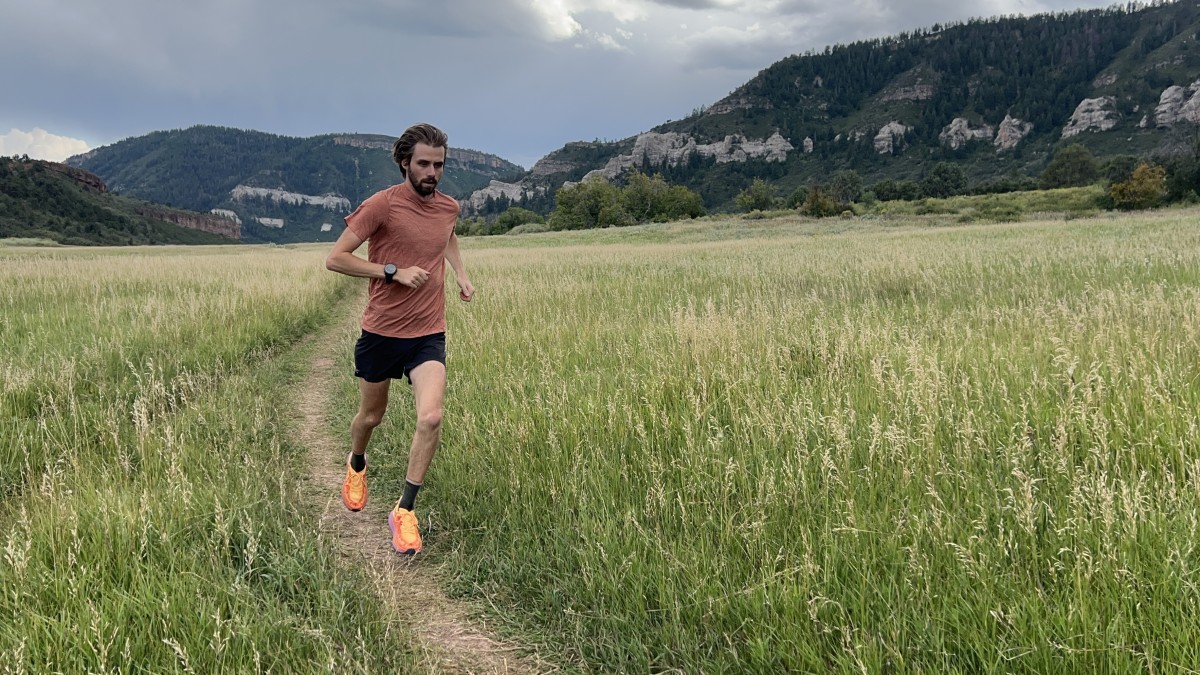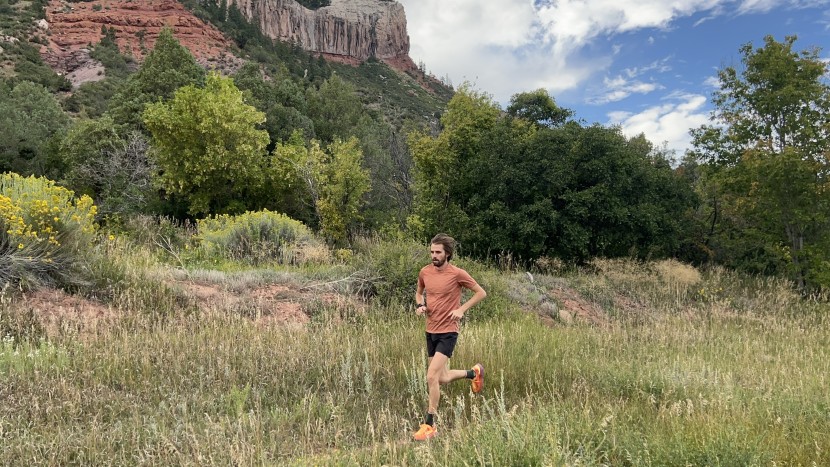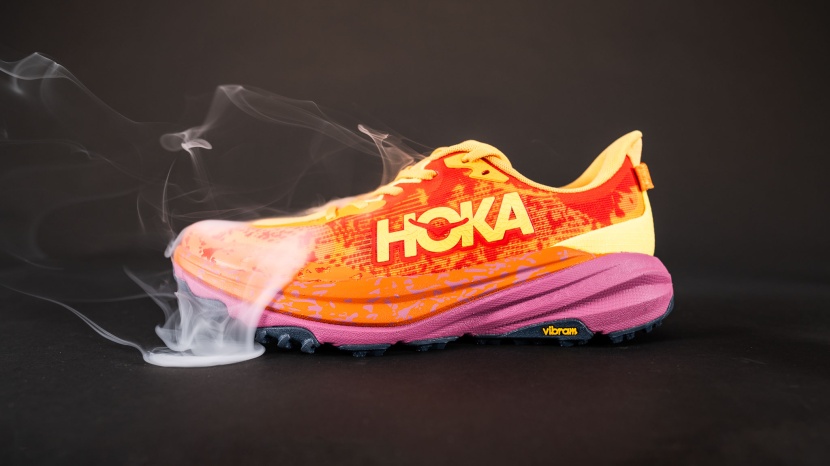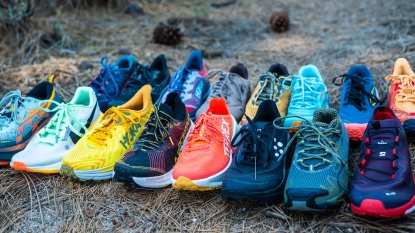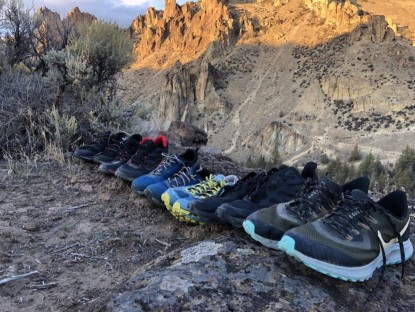
Our Verdict
Our Analysis and Test Results
Throughout our years of testing shoes, Hoka always delivered the best out-of-the-box performance and comfort. This led to some durability concerns hundreds of miles, with the midsole getting mushy. Otherwise, the Speedgoats were a GearLab favorite. The added stiffness of the Speedgoat 6 may be too much of a swing in the other direction for some. We still think it's the best for heavy vert days if you can withstand a longer break-in period.
Comfort and Fit
The Speedgoat continues to provide great upper comfort and a solid ground feel. We experienced no blisters or hotspots during our testing. Drying times and breathability have also been increased with the thinner upper. The volume of this model is smaller, leading to a tighter fit than that of the competition — so if you have larger volume feet, check out the wide version. We appreciate this option, and it can be used to tailor your fit depending on how secure you need the model to feel.
Underfoot comfort is the only knock to the Speedgoat rating when compared to previous versions. Regardless of a stiff break-in or early retirement, the midsole of the 5 and 6 Speedgoats lacks some of the rebound other models are offering in this round of testing.
Stability
We noticed the increased stability during our first outing wearing the new Speedgoat 6. We don't really know if this was needed, but it's a by-product of the more durable foam midsole compound. This wider platform previously supported good stability, and it's been slightly beefed up in this iteration. We felt supported through our ankles, knees, and hips, which led to confident footstrikes even in technical terrain. If you've previously felt like the Hoka Speedgoat series was too soft, consider giving this updated version a shot.
Traction
The Speedgoat's lugs measured 4.6 mm and offered above-average traction. The blend of directional and angular lugs allows for confidence in a variety of different terrain types.
This is the same Vibram Megagrip that has been found on previous models, and largely, the tread design is the same, with slightly different patterning on the heel and outside edge. The shoe's stiffness creates a better feel on rocky terrain as there is less deformation of the midsole.
The traction elsewhere feels largely the same as the previous versions. The Megagrip is slightly softer than the Litebase compound, so it's better in softer conditions, but it also wears faster. We noticed most of the wear towards the heel and outside edge, which is identical to our wear spots in previous generations.
Foot Protection
Foot protection has improved with this iteration due to the denser foam. While it wasn't a problem in the past, this harder foam protects the soles of your feet from impacts from rocks and trail debris. This allows for comfortable long runs even when your feet start to fatigue. Over time, the Speedgoat 6 midsoles softened throughout our testing and weren't so rigid. Once we ran roughly 100 miles in them, the shoes more closely matched the previous iteration.
The neutral rocker is essential with the higher stack, allowing for comfort on more technical terrain. Even on scree and talus, the Speedgoat maintains protection from sharp edges underfoot, which is obviously important for off-camber terrain. The high stack also leads to stress-free heel strikes when descending steep terrain. There is subtle padding on the tongue preventing any lace contact, although the tongue could be longer in our opinion there aren't any concerns with protection within the upper.
Weight
Measured at 10.58 ounces per shoe in US men's size 10.5, the Speedgoat is slightly lighter than the previous iteration, we assume due to the denser midsole compound. The upper has also seen some thinning out and feels more airy and light than the previous version. The Speedgoat never feels ultralight or carefree but also not bogged down. The midsole does lack some energy return, but the follow-through and stride feel largely unimpeded.
For shorter races, you will likely want something a bit lighter with less of a footprint to feel springy and agile. This weight feels well dispersed through the model, and the more neutral flat bottom leads to consistent midfoot strides. We think that every runner should have a tempo effort model and a long-distance/daily trainer. The Speedgoat 6 fills that secondary spot, and this weight class makes easy days feel refreshing, comfortable, and light.
Should You Buy the Hoka Speedgoat 6?
If you have previously used the Speedgoat 4 or 5 expect this edition to feel stiffer. We still think it's the best for heavy vertical days. Out-of-the-box springy midsole compounds are on the market but the added stiffness increases midsole durability and creates a great mountain trail option.
What Other Men's Trail Running Shoes Should You Consider?
For big vert days, we also solidly recommend the Nnormal Tomir 2.0, which features one of our testing team's favorite midsoles. This shoe provides great energy return without sacrificing comfort on long runs. The lugs are more pronounced, allowing the shoe to function better in technical terrain. If you like the Speedgoat 5 for more moderate trails and buffed hardpack, we'd recommend the La Sportiva Prodigio Pro, which has great energy transfer. The Prodigio is stiffer than the previous Speedgoat, so if you desire that out-of-the-box comfort, we'd try and track down the previous version of the Speedgoat — the Speedgoat 5.
| Awards | Best for Trails with High Vertical Change |
|---|---|
| Price | $155 List Check REI (on sale!) |
Overall Score  |
|
| Star Rating | |
| Bottom Line | Updated with a stiffer midsole, this remains the best model for heavy vert days, though it takes some breaking in |
| Pros | Comfortable upper, increased durability, high traction |
| Cons | Longer break in, stiffer underfoot, clunky in technical terrain |
| Rating Categories | Hoka Speedgoat 6 |
| Comfort and Fit (40%) | |
| Stability (25%) | |
| Traction (15%) | |
| Foot Protection (15%) | |
| Weight (5%) | |
| Specifications | Hoka Speedgoat 6 |
| Measured Heel Stack Height | 32 mm |
| Measured Heel-to-Toe Drop | 6 mm |
| Rock Plate | No |
| Measured Lug Depth | 4.6 mm |
| Measured Weight | 10.58 oz |
| Upper | Woven textile |
| Midsole | Responsive Midsole compound |
| Outsole | Vibram Megagrip |
| Sizes Available | 7 - 15 US regular 7 - 15 wide |
| Heel Tab Type | Finger loop |
| Claimed Heel-to-Toe Drop | 5 mm |


